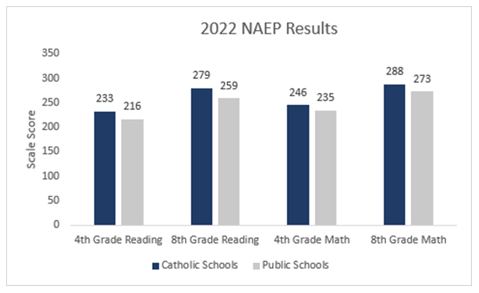 As public school leaders began delving into the details of what went wrong following last week’s release of dismal NAEP reports, Catholic school leaders paused briefly for a victory lap before looking into how they can continue to up their game.
As public school leaders began delving into the details of what went wrong following last week’s release of dismal NAEP reports, Catholic school leaders paused briefly for a victory lap before looking into how they can continue to up their game.
They had good reason to celebrate. Figures from the National Assessment of Education Progress, also known as the Nation’s Report Card, showed Catholic schools outperformed their public school counterparts in almost all categories.
The average score among fourth graders in Catholic schools was 233, 17 points higher than the national public school average, or about 1½ grade levels ahead. In eighth grade reading, the average score for Catholic school students was 279, 20 points higher than the national public school average, or about two grade levels ahead.
Although Catholic school students experienced a statistically significant 5-point drop in eighth grade math, Catholic school students’ average scores remained 15 points higher than the average scores of their public school eighth grade peers.
When broken down by race, Catholic schools showed significant gains since 2019. Achievement among Black students increased by 10 points (about an extra year’s worth of learning), while Black students in public schools lost 5 points.
On the eighth grade reading test, Hispanic students gained 7 points while Hispanic students in public schools lost 1 point.
Catholic schools led the nation for Hispanic achievement on each of the four tests and led the nation in Black student achievement on three of the four. They also ranked first in eighth grade reading and third in both fourth grade reading and fourth grade math for students who qualify for free and reduced-price lunch.
“Today, the divergence between Catholic schools and public ones is so great that if all U.S. Catholic schools were a state, their 1.6 million students would rank first in the nation across the NAEP reading and math tests for fourth and eighth graders,” wrote Kathleen Porter-Magee, superintendent of Partnership Schools, a management company that runs 11 Catholic schools in New York City and Cleveland.
(You can read her opinion piece in the Wall Street Journal here.)
State and local Catholic school scores were not released, but administrators praised the overall results, which they said reflected the benefits of a Catholic education.
“I’m not surprised,” said Father John Belmonte, superintendent of schools for the Diocese of Venice, which includes 16 Catholic schools in 10 Southwest Florida counties. He said while many public schools across the nation shut down for extended periods, Catholic schools remained open.
“Now you’re seeing the difference in-person education makes,” he said.
Enrollment in diocese schools was up 26% last year, with much of that due to what he called “COVID refugees” moving in from out of state to escape shutdowns. He also credited state education choice scholarship expansion, which granted automatic eligibility to children of law enforcement officers and military members
He said a common criticism of private schools is that they can be selective, while public schools must take all comers. However, the data showing that Catholic schools were near the top in learning outcomes for students receiving free and reduced-price lunch demonstrates their commitment to those who economically disadvantaged.
Chris Pastura, superintendent for the Diocese of St. Petersburg, which includes 46 schools in the Tampa Bay area, said he was “thrilled” with the results, which he reflected are a testament to how well Catholic schools handled the pandemic and their overall approach to education.
“It really underscores the power of Catholic schools and the power of education that looks to serve the whole child,” he said, adding that Catholic schools embed academics with the faith and hope that allow people to move through challenges.
Jim Rigg, superintendent of the 62 schools in the Archdiocese of Miami, was so delighted with the NAEP results that he sent a letter to teachers and staff at his schools to express his gratitude.
“We could cite many reasons for the success of our schools,” he wrote. “Catholic schools benefit from strong parent involvement, vibrant communities, and a commitment to serve the whole child. However, I know that the most important reasons our schools succeed is because of the talents, dedication and faith of our Catholic school teachers and other employees. You are our ‘secret sauce’, the real reason our schools rise above others.”


